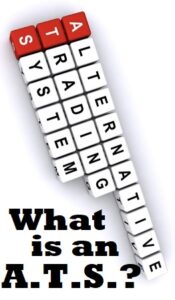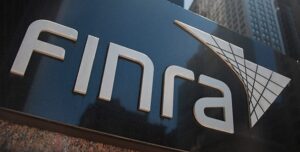ALTERNATE TRADING SYSTEM
lawyers
ATS Lawyers
Cryptocurrency, blockchain tokens, securities, commodities, derivatives, and many other items of value are traded on “exchanges.” Large exchanges are regulated by governmental bodies, such as the SEC, CFTC, FINRA, and the like. Alternative Trading Systems “ATS” offer greater flexibility with less regulation. ATS platforms link up those who wish to buy with those who wish to sell. They are often computer operated “club-like” platforms allowing only subscribing members. Whale.Law lawyers help manage the needs of ATS platforms from inception, to registration, to conflict solutions.
What’s in a Name?
Many names are attributed to alternative trading systems. ATS names include:
-
ECN – Electronic Communications Network (Rule 600(b)(23) of SEC Regulation NMS)
What is an Alternative Trading System?
Whether a marketplace is or is not an ATS is not a matter of opinion, but is rather a creature of regulatory coding of a statute, 17 CFR § 242.300.
An “Alternative Trading System” is any organization, association, person, group of persons, or system:
-
That constitutes, maintains, or provides a market place or facilities for bringing together purchasers and sellers of securities or for otherwise performing with respect to securities the functions commonly performed by a stock exchange; and
-
Does not:
-
Set rules governing the conduct of subscribers other than the conduct of such subscribers’ trading on such organization, association, person, group of persons, or system; or
-
Discipline subscribers other than by exclusion from trading.
What is an ATS “Subscriber? A “subscriber” is any person who has entered into a contractual agreement with an alternative trading system to access such alternative trading system for the purpose of effecting transactions in securities or submitting, disseminating, or displaying orders on such alternative trading system, including a customer, member, user, or participant in an alternative trading system. A subscriber, however, shall not include a national securities exchange or national securities association.

ATS Secrecy Helps!
Crypto whales, institutional investors, hedge fund traders, and the like benefit from the secrecy offered by alternative trading systems. Buyers and sellers often wish to avoid the problems associated with large transactions on national, public exchanges.
Large transactions often cause unproductive price movements as buy/sell orders are processed. Word leaks out, and those who wish to profit by the transaction before it is completed negatively impact the process, thus ATS “dark pools” using block trades are utilized.
Front runners seek to improperly profit from price discrepancies. The public and stock holders may mistake a large buy or sell transaction in an asset as having some greater meaning.
People may attribute motives to the parties to the transaction without the supporting truthful evidence. The less-public nature of ATS transactions reduces these deficiencies.
Alternative Trading System Registration
SEC Regulation ATS forms the basis of ATS registration within the United States. The ATS exchange regulation is codified as 17 CFR § 240.3a1-1. This regulation exempts an ATS from the regulatory requirements of an “exchange” for the SEC. The ATS avoids these SEC regulations if it meets three requirements:
-
Is operated by a national securities association;
-
Complies with Regulation ATS, 17 CFR 242.300 through 242.304; or
-
Pursuant to paragraph (a) of § 242.301 of Regulation ATS, 17 CFR 242.301(a), is not required to comply with Regulation ATS, 17 CFR 242.300 through 242.304.
“During three of the preceding four calendar quarters such organization, association, or group of persons had:
-
Fifty percent or more of the average daily dollar trading volume in any security and five percent or more of the average daily dollar trading volume in any class of securities; or
-
Forty percent or more of the average daily dollar trading volume in any class of securities; and
-
The Commission determines, after notice to the organization, association, or group of persons, and an opportunity for such organization, association, or group of persons to respond, that such an exemption would not be necessary or appropriate in the public interest or consistent with the protection of investors taking into account the requirements for exchange registration under section 6 of the Act, (15 U.S.C. 78f), and the objectives of the national market system under section 11A of the Act, (15 U.S.C 78k-1)
There are a number of use cases and comments that explain, limit, and expand upon ATS registration requirements and exemptions. Suffice to say; avoiding SEC regulatory scrutiny is complex. It requires specialized knowledge and experience. However, it is an analysis that is both necessary for any ATS, but also a sound investment of time, money, and energy; when compared to compliance requirements.
ATS Reporting Requirements
There are a number of SEC reporting requirements for any Alternative Trading System. The most consistent reporting requirement is SEC Form ATS-R.
The main takeways are:
-
Form ATS-R is mandatory
-
It must be filed quarterly
-
The ATS must report the volume of all trades in securities conducted through the trading system
-
The ATS must report the dollar amount of all trades in securities conducted through the trading system
List of Alternative Trading System Venues
There are over 69 ATS entities listed with the Securities and Exchange commission. There are over 91 ATS entities listed with the Financial Industry Regulatory Authority. There are over 38 multilateral trading facilities listed for Europe. For blockchain, the best Cross Networks are:
-
Wrapped Bitcoin(WBTC)
-
Binance Bridge (BNB)
-
Celer cBridge
-
Cross Chain Bridge
-
Umbria Narni Bridge
-
Multichain, formerly known as Fantom Anyswap, and
-
Wormhole
SEC Involvement in an ATS
The Securities and Exchange Commission (SEC) must approve any ATS exchange based in the United States. Enforcement actions by the SEC against ATS front running, and trading using insider ATS gained information have risen in recent years.

FINRA Involvement in an ATS
-
FINRA Rule 6610: The General FINRA rule regarding reporting transactions
-
FINRA Rule 6110: Trading Otherwise than on an Exchange
-
Regulatory Notice 15-48: OTC Equity Volume
-
Regulatory Notice 16-14: Block-Size Trade Data
-
Regulatory Notice 19-29: more on OTC Equity Trading Volume
FINRA reporting is somewhat less stringent that the requirements of true governmental agencies, such as the SEC. However, one should continue to consider FINRA important, and a mandated part of any ATS compliance program.
Watch Out for the “Fair Access” Rule!
Certain Alternative Trading Systems wind up handling a significant percentage of transactions in certain assets.
For example, certain cryptocurrencies have low trading volume. So, if a Crypto Trader or firm wishes to invest in a large amount of the blockchain token, the transactions during that period of time could trigger the “Fair Access” rule.
Another example is that Crypto Whales are known to hold large amounts of cryptocurrency. They frequently desire anonymity and conduct their transactions in ATS venues rather than national cryptocurrency exchanges.
When the Fair Access Rule Applies:
An ATS must comply with the Fair Access Rule when it, during at least 4 of the preceding 6 months, had:
-
5 percent or more of the average daily volume; or
-
5 percent or more of the average daily volume in an equity security that is not an NMS stock for which transactions are reported to, and calculated by a self-regulatory organization, such as the Financial Industry Regulatory Authority (“FINRA”); or
-
5 percent or more of the average daily volume of municipal securities traded in the United States; or
-
5 percent or more of the average daily volume of corporate debt securities traded in the United States.
Fair Access Rule Mandates:
An ATS that meets the above definition must do the following:
-
Establish written standards for granting access to trading on its system;
-
Not unreasonably prohibit or limit any person in respect to access to services offered by the ATS by applying the established written standards in an unfair or discriminatory manner
-
Make and keep certain records regarding the granting, denial, and limitation of such access; and
-
Report certain information to the Commission on Form ATS-R regarding the grants, denial, and limitations of such access.
The Fair Access Rule can spring up requirements surprising to an unprepared ATS. Resolving Fair Access Rule questions involves specific expertise.
Starting an ATS?
Starting an Alternative Trading System can be extremely profitable; however, it requires determination. Let’s talk about the process.


Trial lawyer Matt Hamilton graduated from the University of Missouri – Columbia in 1995 with Science degrees in Logistics, Marketing, and Business Administration.
Matthew J. Hamilton Juris Doctor & Crypto Lawyer